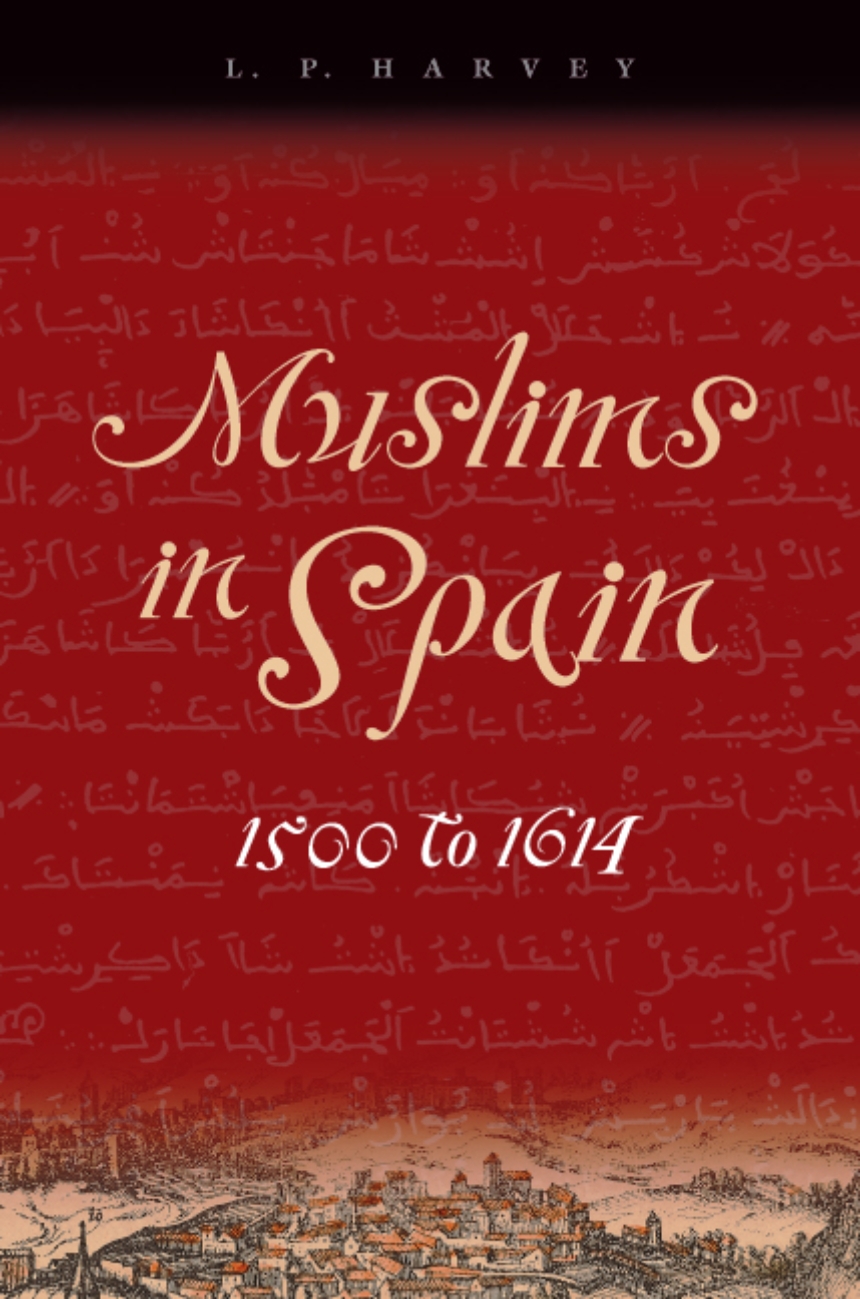Muslims in Spain, 1500 to 1614
On December 18, 1499, the Muslims in Granada revolted against the Christian city government’s attempts to suppress their rights to live and worship as followers of Islam. Although the Granada riot was a local phenomenon that was soon contained, subsequent widespread rebellion provided the Christian government with an excuse—or justification, as its leaders saw things—to embark on the systematic elimination of the Islamic presence from Spain, as well as from the Iberian Peninsula as a whole, over the next hundred years.
Picking up at the end of his earlier classic study, Islamic Spain, 1250 to 1500— which described the courageous efforts of the followers of Islam to preserve their secular, as well as sacred, culture in late medieval Spain—L. P. Harvey chronicles here the struggles of the Moriscos. These forced converts to Christianity lived clandestinely in the sixteenth century as Muslims, communicating in aljamiado— Spanish written in Arabic characters. More broadly, Muslims in Spain, 1500 to 1614, tells the story of an early modern nation struggling to deal with diversity and multiculturalism while torn by the fanaticism of the Counter-Reformation on one side and the threat of Ottoman expansion on the other. Harvey recounts how a century of tolerance degenerated into a vicious cycle of repression and rebellion until the final expulsion in 1614 of all Muslims from the Iberian Peninsula.
Retold in all its complexity and poignancy, this tale of religious intolerance, political maneuvering, and ethnic cleansing resonates with many modern concerns. Eagerly awaited by Islamist and Hispanist scholars since Harvey’s first volume appeared in 1990, Muslims in Spain, 1500 to 1614, will be compulsory reading for student and specialist alike.
Picking up at the end of his earlier classic study, Islamic Spain, 1250 to 1500— which described the courageous efforts of the followers of Islam to preserve their secular, as well as sacred, culture in late medieval Spain—L. P. Harvey chronicles here the struggles of the Moriscos. These forced converts to Christianity lived clandestinely in the sixteenth century as Muslims, communicating in aljamiado— Spanish written in Arabic characters. More broadly, Muslims in Spain, 1500 to 1614, tells the story of an early modern nation struggling to deal with diversity and multiculturalism while torn by the fanaticism of the Counter-Reformation on one side and the threat of Ottoman expansion on the other. Harvey recounts how a century of tolerance degenerated into a vicious cycle of repression and rebellion until the final expulsion in 1614 of all Muslims from the Iberian Peninsula.
Retold in all its complexity and poignancy, this tale of religious intolerance, political maneuvering, and ethnic cleansing resonates with many modern concerns. Eagerly awaited by Islamist and Hispanist scholars since Harvey’s first volume appeared in 1990, Muslims in Spain, 1500 to 1614, will be compulsory reading for student and specialist alike.
“The year’s most rewarding historical work is L. P. Harvey’s Muslims in Spain 1500 to 1614, a sobering account of the various ways in which a venerable Islamic culture fell victim to Christian bigotry. Harvey never urges the topicality of his subject on us, but this aspect inevitably sharpens an already compelling book.”—Jonathan Keats, Times Literary Supplement
462 pages | 6 x 9 | © 2005
History: European History
Religion: Comparative Studies and History of Religion, Islam
Reviews
Table of Contents
Preface
Acknowledgments
List of Abbreviations
1. The Beginnings of Crypto-Islam in the Iberian Peninsula
2. Spain’s Muslims under a New Order
3. The Muslims of Aragon and Valencia up to Their Forcible Conversion
4. Crypto-Muslims in the Lands of the Crowns of Castile and Aragon, 1525-1560
5. The Intellectual Life of Spain’s Clandestine Muslims
6. Crisis and War: Granada, 1567-1571
7. Assimilation or Rejection? The 1570s and 1580s
8. The Last Books Written in Arabic in al-Andalus and the Question of Assimilation
9. Expulsion
10. Aftermath
11. Hornachos: A Special Case
Appendices
I. Religious Freedom and the Modern Spanish Constitution
II. "Morisco" and "Mudejar" in Glosses by Alonso del Castillo
III. The Sacromonte Texts
IV. Góngora on the Sacromonte
V. Some Specimen Official Texts Relating to the Expulsion of the Moriscos
VI. The Moriscos of the Canaries and the Guanches
VII. The Literature of Self-Justification after the Expulsion: A Specimen
VIII. Popular Reactions to the Expulsion
Bibliography
Index
Acknowledgments
List of Abbreviations
1. The Beginnings of Crypto-Islam in the Iberian Peninsula
2. Spain’s Muslims under a New Order
3. The Muslims of Aragon and Valencia up to Their Forcible Conversion
4. Crypto-Muslims in the Lands of the Crowns of Castile and Aragon, 1525-1560
5. The Intellectual Life of Spain’s Clandestine Muslims
6. Crisis and War: Granada, 1567-1571
7. Assimilation or Rejection? The 1570s and 1580s
8. The Last Books Written in Arabic in al-Andalus and the Question of Assimilation
9. Expulsion
10. Aftermath
11. Hornachos: A Special Case
Appendices
I. Religious Freedom and the Modern Spanish Constitution
II. "Morisco" and "Mudejar" in Glosses by Alonso del Castillo
III. The Sacromonte Texts
IV. Góngora on the Sacromonte
V. Some Specimen Official Texts Relating to the Expulsion of the Moriscos
VI. The Moriscos of the Canaries and the Guanches
VII. The Literature of Self-Justification after the Expulsion: A Specimen
VIII. Popular Reactions to the Expulsion
Bibliography
Index
